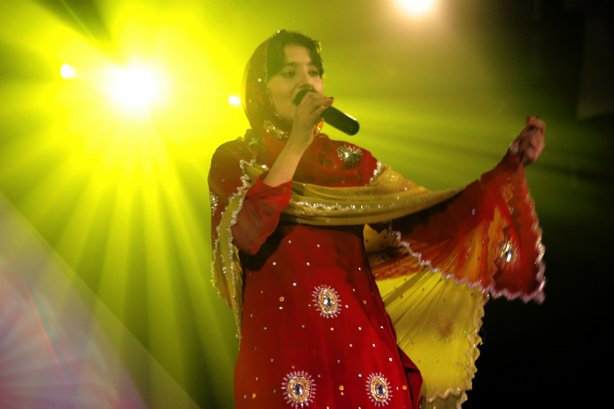
Movie Review: Afghan Star
There is a specter haunting Afghanistan – the ghost of Simon Cowell (British talent judge on such wannabe-famous shows as American Idol and Britains Got Talent). But the Afghan version of these on-air talent hours, the program Afghan Star, is not only the subject of Havana Markings documentary. The show proves itself a democratic forum that defies much of what was banned or punished by death, ibefore 2001, in Afghanistan.
If there is a lesson to be learned from this probing and entertaining film, it is that freedom advances in unexpected ways.
At least a third of Afghanistan, about 11 million people, now watches Afghan Star, in which young contestants compete for something new in that society, fame. The shows appeal to the public, minus the nastiness and tawdriness of its American progenitor, is magnetic, even messianic – all the more reason for the Taliban to hate the show.

Director of "Afghan Star" Havana Marking in Kabul
Its not that fundamentalists view television as bad – the question is, “whose television?” Remember that Kabul a decade ago was the place where citizens were required to attend public stonings of adulterers in the soccer stadium – which were camera-ready and televised, as, by the way, were the beheadings that became an al Qaeda trademark. Singing in public could certainly have earned you a trip to eternity, and in parts of the country, especially if you are a woman who chooses to dance while you sing, death threats are still the cost.
The contestants and producers of Afghan Star, along with members of the public who are interviewed, are aware that this show is one improbable amateurish step toward civilizing their country. Gallows humor about how the Taliban view the spectacle runs through the film. The shows viewers vie with each other to declare that they dont fear fundamentalist disapproval, all of which indicates that religious leaders have been calling the shots up to now, and still weigh heavily on much of what is permitted.
Of course, the experience of performing in public changes the contestants lives. The men become pop heroes, but the women tend to be stigmatized in a country where even the viewers of this controversial TV show can be conservative. The public votes by mobile phone, leaping over generations of technological isolation. Leaping into the modern world turns out to be more difficult than anything that Susan Boyle faced when she became an unlikely champion in Scotland, and then lost.
Its bad enough to be a woman in Afghanistan, especially a woman entertainer. And its still a fractious place. The viewers in tribal Afghanistan tend to vote for contestants from their own tribes, and one man buys thousands of dollars worth of SMS texting to make sure his tribes candidate has an advantage. By Afhgan corruption standards, this is small potatoes, charmingly innocent. Yet its a sign that ancient divisions remain.
Setara, a singer from Herat – for whom Kabul is the big city — uncovers her hair on camera and dances to a farewell song after being excluded from future competition. She is taken away quickly in a minivan for fear that her brazen and courageous performance (by local standards) could get her hurt.
Paranoia? Theres footage of a mullah denouncing her and urging television viewers to punish her. “She brought shame to the Herati people,” one person on the streets says, “She deserves to be killed.”
We learn eventually that Setara has moved back to Kabul, where she is making a recording. Are things moving forward? If so, they do so at a crawl, as the shows producer takes us on a tour of what had been modern Kabul – with movie theaters and other places of entertainment, all in ruins. It could still revert back to barbarism, Havana Marking hints in cutaway shots to armed men blocking cars.
The show is a beginning of something, yet we not sure what just yet. For once, here is a film that deserves a sequel.
